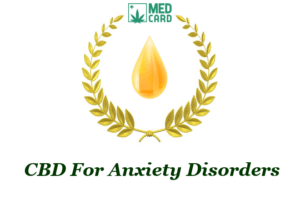
Treating Cyclical Vomiting Syndrome with Medical Marijuana
- Many patients using medical marijuana to treat cyclical vomiting syndrome are finding relief from the sudan onset of nausea.
- However, cannabis actually seems to trigger cyclical vomiting syndrome in some users.
- Not all U.S. states offer a medical marijuana card for cyclical vomiting syndrome. However, all patients can buy hemp-derived CBD oil online.
- Marijuana dispensaries nationwide offer a wide variety of cannabis products suitable for the treatment of nausea.
What is cyclic vomiting syndrome?
CVS or cyclical vomiting syndrome is a mysterious disorder known to cause violent, sudden episodes of uncontrollable vomiting and nausea, for no apparent reason. While some patients find relief from their nausea with medical mariuana, others find that cannabis triggers the condition.
These severe bouts of vomiting associated with CVS often last for hours, and in some cases for days. Many sufferers often experience long symptom-free periods in between episodes. Data indicates that most episodes tend to start at the same time, last approximately the same length of time, and generally occur with the same intensity.
Cyclical vomiting syndrome has many debilitating symptoms including severe non-stop vomiting, intense sweating, diarrhea, light sensitivity, abdominal pain, dizziness, fever, headaches, fatigue, inability to talk, loss of appetite, dry heaving, pale skin, and excessive thirst.
CVS can happen at any stage in life, although, in most cases, it starts in childhood. The onset of CVS usually occurs between three to seven years of age. However, the number of adult CVS cases is on the rise.
Some children suffering from CVS may experience rapid-fire, projectile vomiting every five to fifteen minutes, followed by long periods of dry heaving.
This syndrome is exceedingly hard to diagnose because nausea and vomiting are common symptoms exhibited in many other conditions.
One possible cause of CVS may be abnormal Mitochondrial DNA. These abnormalities may be due to genetics, illness, or exposure to toxins. Individuals suffering from chronic migraines may also develop CVS.
Other conditions could also play a role in the onset of CVS such as problems with the brain, spinal cord, or nervous system control over the body’s gastrointestinal tract responses, hormonal imbalances, high blood pressure, gastroesophageal reflux disease, and irritable bowel syndrome.
Statistically, physicians diagnose approximately 3 out of 100,000 children with CVS annually. At present, medical experts are unable to determine how common this syndrome is in adults. It’s a rare occurrence. However, some practitioners believe that since it often goes undiagnosed CVS may be just as prevalent in the adult population.
Does cannabis cause or help cyclic vomiting syndrome?
Medical marijuana is a common treatment for chemo-related nausea and vomiting due to its potent antiemetic (anti-nausea) properties. And many CVS sufferers will attest that cannabis improves their condition.
Symptoms of CVS often appear in chronic cannabis users with daily exposure to the herb. These patients mistakenly increase their consumption of marijuana to relieve their nausea, only to find that it exacerbates the symptoms. Cannabis also seems to be a trigger for another condition similar to cyclic vomiting syndrome known as cannabinoid hyperemesis syndrome.
A recent study suggests that CHS can be triggered by both edible and inhaled THC, although there are more instances of the syndrome from inhaled cannabis.
There are a few existing theories as to why CHS has become more prevalent amongst chronic pot smokers. One common belief is that extremely high THC levels currently found in some marijuana strains may negatively affect certain genetically predisposed individuals. High doses of cannabinoids may cause autonomic dysregulation, which can lead to nausea and vomiting. Another possibility for the spike in CHS cases may be due to the pesticide use in cannabis farming.
Currently, the only effective way to eliminate symptoms associated with cannabis use is total cessation.
How does medical marijuana help reduce nausea and vomiting?
For millennia, medical marijuana has proven to be a safe, natural, and effective way to help reduce nausea. In recent decades, extensive laboratory research indicates that supplementing with phytocannabinoids produced in marijuana can significantly reduce nausea.
A report titled “Nausea and Vomiting” by the United Patients Group for alternative medicine states unequivocally:
“There is strong evidence that the cannabinoids naturally produced in the body play a role in suppressing nausea in normal circumstances, and intake of cannabinoids from medical marijuana during episodes of nausea can also effectively relieve symptoms… Inhaled medical marijuana achieves superior results in reducing nausea and vomiting over synthetic alternatives…”
And a more recent report from the European Journal of Pharmacology concludes:
“In humans and animal models, plant-derived cannabinoids, synthetic cannabinoids, and endocannabinoids inhibit emesis [vomiting] evoked peripherally or centrally with drugs or natural stimuli. Cannabinoids block both acute and delayed emesis. We believe that the endocannabinoid system has the potential to be used for the treatment of nausea and likely as an adjunct therapy for the treatment of emesis, particularly delayed emesis, where current therapies are limited in their degree of efficacy.”
The publication went on to say that cannabinoids in medical marijuana can be as effective as prescription medications such as prochlorperazine and ondansetron, traditional antiemetics for controlling chemo-induced nausea and vomiting.
How is medical marijuana used to treat cyclical vomiting syndrome?
Cyclical vomiting syndrome is a condition that produces a sudden onset of nausea. As such, a medical marijuana delivery method with a fast onset time is ideal.
Inhalation methods including smoking and vaping medical marijuana or cannabis concentrates, and cannabinoid inhalers produce the fastest onset of effects and the highest bioavailability.
Oral cannabis products such as tinctures, cannabis-infused capsules, and marijuana edibles offer easy and accurate dosing. However, the onset time is slow and the bioavailability is much lower than inhaled cannabinoids.
Because cannabis might actually trigger the condition, new medical marijuana patients are advised to start with the lowest possible dosage. If no adverse effects are felt, then the dosage can be slowly increased until an effective dosage has been reached.
Keep in mind that excessively high doses of cannabinoids can actually reduce the effectiveness of medical marijuana and cause unwanted side effects such as excessive intoxication and lethargy — especially with high-THC cannabis products.
Medical marijuana isn’t legal in every state. Moreover, cyclical vomiting is not a qualifying condition in every state that offers medical marijuana cards. However, some U.S. states such as California, Colorado, Nevada, Illinois, Massachusetts, and 13 others allow all adults 21+ to shop at local dispensaries.
And in states where patients do not have access to marijuana or THC-infused cannabis products, then oils and edibles made from low-THC, high-CBD hemp might be a good option. Some patients find that CBD oil or smoking/vaping high-CBD hemp flower can be quite effective at relieving nausea in some patients. Anyone can buy CBD online regardless of what state they live in.
Conclusion
Cyclical vomiting syndrome is a rare condition. In many cases, medical marijuana can help patients deal with sudden and ongoing bouts of nausea. However, in a small percentage of cases, it seems that cannabinoids might actually trigger CVS. As such, new patients need to start with minimum dosages and remain alert to any unwanted side effects. Treatment should be administered under the guidance of an experienced medical marijuana doctor.
Marijuana strains reported to help with Cyclical Vomiting Syndrome:
Royal Cookies
Royal Moby
OG Kush
Durban Poison
Sour Diesel
Blue Dream
Jack Herer

Sign Up for Medical Cannabis Today!
For potential patients, if you’re ready, we make it easy to connect with a medical marijuana doctor nearby or online. If you are interested in getting certified, please fill out the MMJ patient registration form below and press submit to get started. See if you qualify today!

MedCard Registration Form


Helpful Medical Marijuana Links:
Sources and additional reading
- Association of Marijuana Use and Cyclic Vomiting Syndrome
- Cannabinoid hyperemesis and the cyclic vomiting syndrome in adults: recognition, diagnosis, acute and long-term treatment
- Patterns of Cannabis Use in Patients With Cyclic Vomiting Syndrome
- Cannabinoid hyperemesis syndrome
- Regulation of nausea and vomiting by cannabinoids
- The role of the endocannabinoid system in the regulation of endocrine function and in the control of energy balance in humans
- The role of cannabinoids in regulation of nausea and vomiting, and visceral pain

















